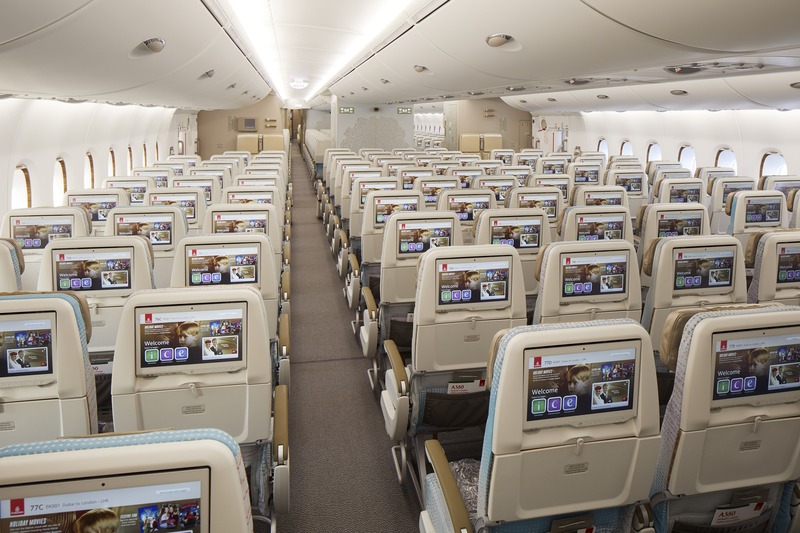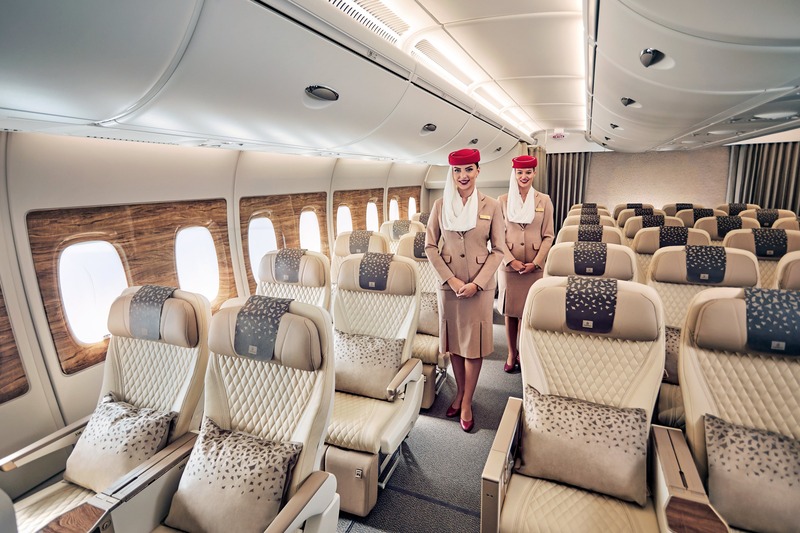
Emirates, the world’s largest operator of Airbus A380s, is taking its European operations to new heights by introducing its newly retrofitted A380 aircraft to Manchester and Milan.
These aircraft feature the airline’s latest cabin upgrades, including the much-anticipated Premium Economy class, alongside refreshed interiors across all cabin classes. This move is part of Emirates’ multi-billion-dollar retrofit program aimed at modernizing its fleet and enhancing passenger comfort.

Starting June 6, Emirates will deploy the upgraded A380s on flights EK017 and EK018 between Dubai and Manchester. Following this, the retrofitted aircraft will begin operating on flights EK091 and EK092 to Milan from July 1. The introduction of these aircraft marks a significant milestone for Emirates as it expands its Premium Economy offering to more destinations in Europe.
The airline has already introduced these upgraded A380s on routes to London Heathrow, New York JFK, Sydney, Paris, and Christchurch.
Premium Economy: A New Level of Comfort
The highlight of these retrofitted A380s is the Premium Economy cabin, which offers passengers a unique blend of luxury and affordability. Designed to bridge the gap between Economy and Business Class, Premium Economy features 56 seats arranged in a spacious 2-4-2 configuration.
Each seat is crafted for maximum comfort, offering up to 40 inches of pitch, wider seats with adjustable headrests, and generous recline. Passengers can also enjoy in-seat charging points, a side cocktail table for added convenience, and premium dining options curated exclusively for this class. Complementing the elevated experience are fine beverages such as Chandon Vintage Brut 2016.

Upgrades Across All Cabins
The retrofit program doesn’t stop at Premium Economy—passengers across all cabin classes will benefit from enhanced features. First Class suites on the refurbished A380s offer unmatched privacy with closing doors, virtual windows for middle suites, zero-gravity seats designed for ultimate relaxation, and gourmet dining options served on demand.
Business Class travelers will enjoy lie-flat beds with direct aisle access, updated finishes inspired by luxury automotive interiors, and an onboard lounge where passengers can socialize or relax during their flight.
Economy Class passengers are also in for an improved experience with ergonomically designed seats featuring adjustable headrests and enhanced entertainment systems with larger screens. Across all classes, Emirates’ award-winning inflight entertainment system, ICE (Information, Communication, Entertainment), offers over 5,000 channels of movies, TV shows, music playlists, games, and live sports.
Strategic Expansion
The introduction of these retrofitted A380s to Manchester and Milan is part of Emirates’ broader strategy to meet growing demand for premium travel experiences while maintaining its position as a leader in global aviation. By expanding its Premium Economy offering to new markets, Emirates is catering to passengers who seek elevated comfort without the higher cost associated with Business Class.
Manchester currently enjoys three daily Emirates flights operated by both A380s and Boeing 777s. The addition of the retrofitted A380s will enhance passenger choice on this busy route. Similarly, Milan benefits from multiple daily flights connecting Italy to Dubai’s global hub. With these upgrades in place by mid-2025, passengers traveling from Manchester and Milan will have access to Emirates’ latest cabin features on long-haul journeys to popular destinations such as Sydney, Singapore, Mumbai, Osaka, and Bangkok.

Fleet Modernization Program
Emirates’ retrofit initiative is part of a $2 billion investment aimed at upgrading 120 aircraft in its fleet—comprising both Airbus A380s and Boeing 777s—over the next few years. The program reflects Emirates’ commitment to sustainability by extending the lifecycle of its existing fleet while introducing cutting-edge technologies for improved fuel efficiency and passenger comfort.
Looking Ahead
As Emirates continues to innovate and expand its services globally, the deployment of these retrofitted A380s signals a new era of travel for passengers flying through Manchester and Milan. Whether traveling for business or leisure, passengers can look forward to enjoying world-class amenities that redefine air travel standards.
With its extensive network spanning six continents and connections to over 140 destinations worldwide, Emirates remains dedicated to delivering exceptional travel experiences tailored to diverse customer needs.
This latest development further solidifies Emirates' reputation as an industry leader committed to blending luxury with accessibility while setting benchmarks for innovation in aviation. Passengers departing from Manchester or Milan can now anticipate a seamless journey aboard one of the most advanced aircraft in the skies today.

.jpg)

.jpg)


.jpg)


.jpg)
.jpg)

.jpg)



.jpg)
.jpg)


.jpg)

.jpg)




.jpg)





.jpg)
.jpg)


.jpg)
 (1).jpg)
.jpg)
.jpg)
.jpg)

.jpg)

.jpg)
.jpg)
 (1).jpg)





